

How to Start Your Information Diet. How to Start Your Information Diet Jan 02, 2012 Clay Johnson So 2012 is nearly upon us, and a lot of people -- people like Gina Trapani, Tim O'Reilly, and Ev Williams -- are planning a New Year's resolution of an Information Diet. Here are some tips for how you can get started: 1. Keep a Journal Start monitoring what it is you're taking in, and timing yourself. #StopSOPA. Diventa "tua" ecco le nuove funzioni social. Da oggi una versione più ricca del sito: ogni lettore potrà scegliere su quali argomenti essere aggiornato, archiviare articoli da leggere in un secondo momento, personalizzare una parte della homepage, condividere e discutere le notizie con gli amici di ALESSIO BALBI Repubblica.it diventa un po' più vostra: da oggi viene aperto all'intero pubblico dei lettori "La tua Repubblica.it", un servizio che permetterà a chi lo desidera di accedere a una versione più ricca e personalizzata del sito.
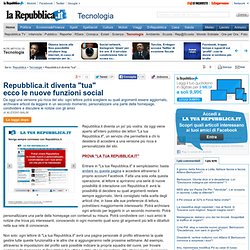
Entrare in "La tua Repubblica.it" è semplicissimo: basta andare su questa pagina e accedere attraverso il proprio account Facebook. Fatta una sola volta questa operazione, al lettore si apriranno una serie di nuove possibilità di interazione con Repubblica.it: avrà la possibilità di decidere su quali argomenti restare sempre aggiornato.
PierLuca Santoro. Libri - FILTER BUBBLE - Eli Pariser. La società è un insieme di minoranze.
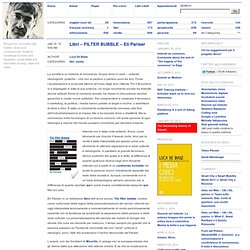
Gruppi divisi in isole – culturali, ideologiche, pratiche – che non si parlano o parlano poco tra loro. Forse l’accelerazione è avvenuta attorno all’inizio degli anni Ottanta. The Filter Bubble: What the Internet Is Hiding from You (9781594203008): Eli Pariser. Le notizie di ieri, domani (cit.) The Impracticality of a Cheeseburger. What does the cheeseburger say about our modern food economy?
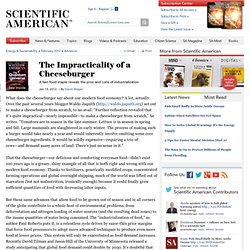
A lot, actually. Over the past several years blogger Waldo Jaquith ( set out to make a cheeseburger from scratch, to no avail. “Further reflection revealed that it’s quite impractical—nearly impossible—to make a cheeseburger from scratch,” he writes. Capitalismo parassitario. I Mezzi di Comunicazione tra Deriva e Viaggio [sul pensiero di Zygmunt Bauman] Vivere da web celebrity. Gina Trapani ha un blog molto letto, Smarterwere, in cui parla della realtà tecnologica del web e della nostra vita sociale in Rete, ha sviluppato alcune applicazioni che la monitorano, scritto un libro, Lifehacker, per insegnarci a lavorare in modo più veloce e più smart con le tecnologie e possiede un profilo su Twitter che ha superato i 200 mila followers.

Un punto di non ritorno. The Flip Side of a Big Audience. "Bloggers are famous enough to have stalkers, but not famous enough to have bodyguards.
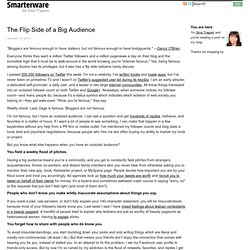
" —Danny O'Brien Everyone thinks they want a million Twitter followers and a million pageviews a day on their blog and the incredible high that it must be to walk around in the world knowing you're "internet famous. " Yes, being famous among dozens has its privileges, but it also has a flip side netizens rarely discuss. I passed 200,000 followers on Twitter this week. I'm not a celebrity. Reality check: Lady Gaga is famous. I'm not famous, but I have an outsized audience. Social Media Accounts and Conversations on the Rise. Companies often have several different accounts or pages on social networks like Facebook and Twitter.
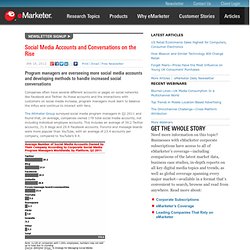
As these accounts and the interactions with customers on social media increase, program managers must learn to balance the influx and continue to interact with fans. The Altimeter Group surveyed social media program managers in Q2 2011 and found that, on average, companies owned 178 total social media accounts, not including individual employee accounts. This includes an average of 39.2 Twitter accounts, 31.9 blogs and 29.9 Facebook accounts. Forums and message boards were more popular than YouTube, with an average of 23.4 accounts per company, compared to YouTube’s 9.4. Publications Social Media ROI Metrics Still Chaotic 01/18. Brand marketers continue to struggle with determining return on investment for social media campaigns.
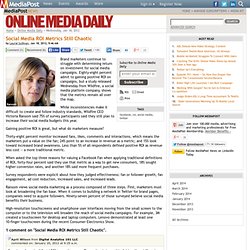
Eighty-eight percent admit to gaining positive ROI on campaigns, but a study released Wednesday from Wildfire, a social media platform company, shows that the metrics remain all over the map. While inconsistencies make it difficult to create and follow industry standards, Wildfire CEO Victoria Ransom said 75% of survey participants said they still plan to increase their social media budgets this year. Gaining positive ROI is great, but what do marketers measure? Thirty-eight percent monitor increased fans, likes, comments and interactions, which means the marketers put a value on the fan; 24% point to an increase in revenue as a metric; and 15% look toward increased brand awareness. Less than 5% of all respondents defined positive ROI as revenue less cost -- a more traditional metric. Internet 2011 in numbers. So what happened with the Internet in 2011?
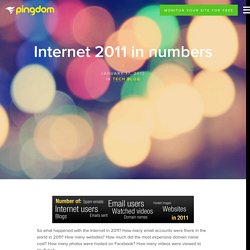
How many email accounts were there in the world in 2011? How many websites? Facebook, sempre meno "Mi piace" le apps sceglieranno i propri verbi. Politico and Facebook team up to use data for political journalism. The Innovation Obsession. Forget the buzzword, what is true innovation?

How should it be used and how does it affect our everyday lives? Harvey Briggs takes a critical look at how the concept of innovation is used today, and what it should be. In my travels and in my work I hear the word “innovation” thrown around a lot these days. Everybody’s talking about it. You can’t open a business magazine without reading an article featuring it. “Innovation” today is much like “Branding” was in the ‘90s; greatly overused and highly misunderstood. Putting temperature sensitive ink on your labels so you know when your beer is cold is not innovation. Adding Buffalo mozzarella to your frozen pizza and calling it “Artisan” is not innovation. Installing a voice-activated, web-enabled, Google-powered infotainment center in your minivan is not innovation. You may be asking, “But why? Absolutely. La civiltà dell'empatia. La corsa verso la coscienza globale nel mondo in crisi By Jeremy Rifkin Like La civiltà dell'empatia ?
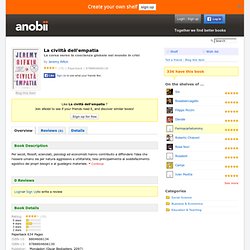
Join aNobii to see if your friends read it, and discover similar books! Sign up for free Book Description Per secoli, filosofi, scienziati, psicologi ed economisti hanno contribuito a diffondere l'idea che l'essere umano sia per natura aggressivo e utilitarista, teso principalmente al soddisfacimento egoistico dei propri bisogni e al guadagno materiale.